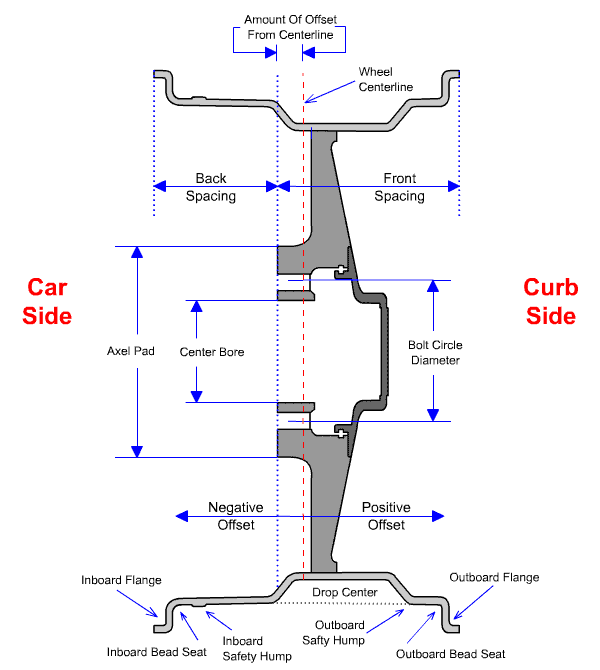Unlocking Your Ride: The Ultimate Guide to Wheel Rim Measurement
Ever wondered if those slick new rims will fit your ride? Knowing how to determine wheel rim size is crucial for both performance and aesthetics. Getting the wrong size can lead to rubbing, poor handling, and a whole lot of frustration. This guide will empower you with the knowledge to confidently measure your wheel rims and ensure a perfect fit.
So, what's the big deal about accurately measuring your wheels? Well, imagine putting on shoes that are two sizes too small – uncomfortable, right? The same applies to your car's wheels. Incorrect measurements can negatively impact your car's performance, safety, and even its resale value. This comprehensive guide dives deep into the art of wheel rim measurement, providing you with everything you need to know.
The history of wheel measurement is intertwined with the evolution of the automobile itself. As cars became more sophisticated, so did the need for precise wheel and tire combinations. Early methods were often crude, relying on simple rulers and estimations. Today, determining wheel rim dimensions accurately is a critical aspect of car maintenance and modification, allowing for optimized performance and a customized look. Understanding this evolution helps us appreciate the precision involved in today’s methods.
One of the main issues people face when learning how to get wheel rim measurements is understanding the different aspects involved – diameter, width, bolt pattern, offset, and center bore. Each of these plays a vital role in ensuring proper fitment. This guide breaks down each component in easy-to-understand language, eliminating the confusion and equipping you with the confidence to measure like a pro.
Before we dive in, let's define some key terms. Wheel diameter refers to the measurement across the wheel from one edge to the other, typically expressed in inches. Wheel width is the distance between the inner and outer edges of the rim's barrel, also measured in inches. Bolt pattern refers to the arrangement of the lug holes, usually expressed as a number x diameter (e.g., 5 x 114.3mm). Offset is the distance between the wheel's mounting surface and the centerline of the rim. Finally, the center bore is the diameter of the hole in the center of the wheel. Understanding these terms is the foundation for accurate wheel measurement.
One benefit of knowing how to assess wheel rim sizes is improved handling. Properly fitted rims ensure your tires make optimal contact with the road, leading to better grip, steering response, and overall control. For example, a wider rim can accommodate a wider tire, increasing the contact patch and improving cornering stability.
Another advantage is enhanced safety. Incorrectly sized rims can cause interference with suspension components or the body of the car, potentially leading to dangerous situations. Accurately measuring your rims and ensuring proper fitment mitigates these risks, keeping you and your passengers safe. For example, using a rim with the wrong offset can cause the wheel to protrude too far outwards, increasing the risk of damage from curbs or other obstacles.
Finally, correctly sized rims improve the aesthetics of your car. The right set of wheels can complement your car’s design and give it a unique, personalized look. Knowing how to obtain wheel rim dimensions allows you to confidently choose wheels that fit perfectly and enhance your car’s appearance.
To accurately measure your wheel rims, you'll need a measuring tape or ruler. First, measure the diameter from one edge of the rim to the other, passing through the center. Next, measure the width between the inner and outer edges of the rim’s barrel. To determine the bolt pattern, count the number of lug holes and measure the distance across the circle formed by the center of those holes.
Advantages and Disadvantages of Measuring Your Own Wheel Rims
| Advantages | Disadvantages |
|---|---|
| Cost-effective - no need to pay a professional | Potential for inaccuracies if not done carefully |
| Empowering - gives you control over the process | Requires some basic tools and knowledge |
Frequently Asked Questions:
Q: What tools do I need to measure wheel rims?
A: A measuring tape or ruler is sufficient.
Q: How do I measure wheel offset?
A: Offset is typically stamped on the back of the wheel. If not, consult a professional.
Q: Why is it important to know my wheel's bolt pattern?
A: The bolt pattern determines compatibility with your vehicle's hubs.
Q: Can I use a wider rim on my car?
A: Yes, but it depends on your car's specifications and tire clearance.
Q: How do I find the center bore of my wheel?
A: The center bore is usually stamped on the back of the wheel.
Q: What if my measured dimensions don't match any standard sizes?
A: Consult a wheel specialist.
Q: Can I measure rims with tires mounted?
A: Yes, but it’s more accurate to measure without tires.
Q: Where can I find more information on wheel fitment?
A: Online forums and automotive websites offer valuable resources.
In conclusion, understanding how to measure wheel rims is an essential skill for any car enthusiast. It empowers you to make informed decisions about wheel upgrades, ensuring proper fitment, optimal performance, and enhanced safety. By taking the time to accurately measure your wheel rims, you’ll avoid potential problems and enjoy the benefits of a perfectly fitted set of wheels. Start measuring today and unlock the full potential of your ride!
Sustaining power the underrated elegance of marine battery maintenance
Sabre gray 1482 the benjamin moore shade thats taking over
Unlocking underwater worlds humminbird wide view fish finders














